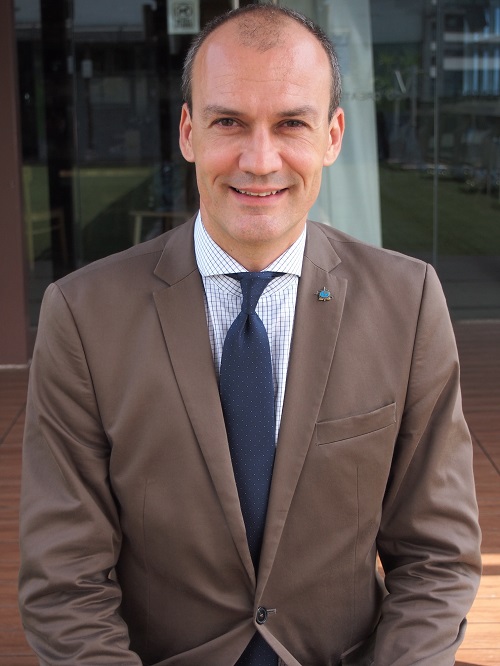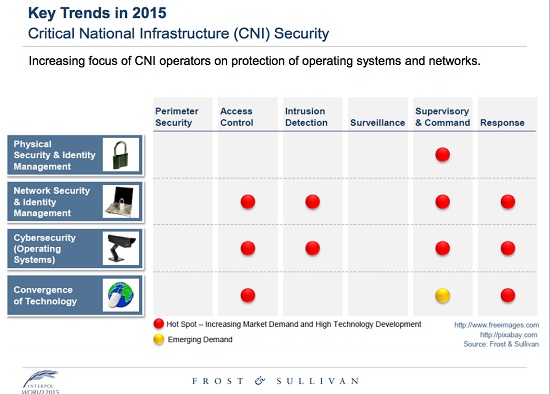Cybersecurity: Public sector left in the lurch
By Gabey Goh March 19, 2015
- Solutions do not address operational requirements of public sector agencies
- Interpol World, from April 14-16 in Singapore, to discuss this and other issues

THERE is a great demand in Asia Pacific for cybersecurity solutions, but this is being held back by not just budget constraints, but even more so by the simple lack of fit.
“In our talks with various stakeholders, one consistent feedback was the fact that many of solutions do not necessarily address operational requirements of the public sector agencies which are would-be users,” said Frost & Sullivan director of Public Sector and Security Practice, Richard Wong.
The Asia Pacific region holds much growth potential for cybersecurity providers, amidst the growing complexity of securing digital assets and the increasing frequency of attacks by those who would seek to exploit them, he said.
Wong was sharing his thoughts during a media briefing on the upcoming Interpol World, slated to take place from April 14-16 at the Sands Expo & Convention Centre in Singapore.
The biennial trade event is intended to promote public private partnerships and serve as a business platform for security manufacturers and service providers to offer innovative security solutions to law enforcement agencies, government officials and security professionals from the commercial sectors.
 “Interpol World will provide an excellent opportunity to exchange concerns and considerations from the client point of view and help solution providers have better understanding to customise solutions,” said Wong (pic).
“Interpol World will provide an excellent opportunity to exchange concerns and considerations from the client point of view and help solution providers have better understanding to customise solutions,” said Wong (pic).
“When it comes to cybersecurity, there is a greater demand for collaboration and greater focus for awareness and education in developing solutions that can cut across market segments to enhance security for different jurisdictions,” he added.
Interpol World comes in the wake of the International Criminal Police Organisation (Interpol) announcing in 2013 that it would be establishing a Global Complex for Innovation (IGCI) in Singapore.
The IGCI here, its second such facility outside of France, encompasses the Interpol Digital Crime Centre (IDCC), which will build capacity and support police in its endeavours to confront 21st century crime.
It became operational in 2014 but will have its official opening on April 13, in conjunction with Interpol World and the 22nd Interpol Asian Regional Conference scheduled for April 15-17.
Interpol World is expecting to host over 250 international industry players from 35 countries with approximately 8,000 commercial buyers, police, law enforcement and government officials attending.
In addition the event will be welcoming seven national groups from Austria, France, Malaysia, The Netherlands, Singapore, the United States and Israel showcasing their latest technologies and capabilities.
Frost & Sullivan is the official knowledge partner for the event.
 “For the first time in our history we are holding an event that provides an international platform bringing together government and industry. This will be a wonderful opportunity to open up dialogue on critical issues,” said Thomas Herko (pic), assistant director of International Partnerships & Development at the Interpol Global Complex for Innovation.
“For the first time in our history we are holding an event that provides an international platform bringing together government and industry. This will be a wonderful opportunity to open up dialogue on critical issues,” said Thomas Herko (pic), assistant director of International Partnerships & Development at the Interpol Global Complex for Innovation.
“This is in line with our mandate under the IGCI, as we are supposed to encourage multi-stakeholder practitioners from both private and public sphere to collaborate to generate solutions,” he added.
Speaking to Digital News Asia (DNA) on the sidelines of the briefing, Herko said there was a clear need for law enforcement agencies to catch up with the rapid moving trends in cybercrime.
“This is one of the areas in which Interpol is providing member countries with support,” he said.
The related Interpol World Congress will feature forums on four areas of focus: Cybersecurity, safe cities, border management and supply chain security.
Cybersecurity
The increasing reliance on the Internet has created unexpected vulnerabilities that allow coordinated and complex attacks to happen within minutes.
With more than 60,000 pieces of malware created daily to infiltrate security systems, there is a need for robust partnerships between law enforcement and private sector Internet security companies, as well as coordinated regulations across countries.
“The world is swiftly moving into cyberspace and more people are living their lives virtually, from social interactions to personal and business transactions,” said Keshav Dhakad, Asia regional director, IPR & Digital Crimes Unit (DCU), Legal and Corporate Affairs, Microsoft Corp.
“There is an imperative need for the IT and security industry to invest in the development of essential technology, tools and training to generate and share actionable information and intelligence on cybersecurity trends and threats,” he added.
According to the Frost & Sullivan Global Cybersecurity Market Assessment for 2014, the global cybersecurity market is expected to grow at a compound annual growth rate (CAGR) of 11.8% from US$71 billion in 2013 to US$155 billion in 2020.
Safe cities
A nation’s well-being and prosperity hinges on the safety, functionality and resilience of its critical national assets – organisational and physical structures and facilities that are vital to society and its economy.
Total Command, Control, Communications, Computers, Intelligence, Surveillance and Reconnaissance (C4ISR) spending between 2012 and 2021 is expected to be over US$ 1 trillion, with the spending increasing from US$100 billion in 2012 to US$130 billion in 2021 at a CAGR of 2.9%, according to the Frost & Sullivan Global C4ISR Market Assessment 2013.

Border management
With the increasing mobility of people and goods in our globalised world, organised crime groups are making use of easy and convenient transborder access to commit crimes.
“In the current security landscape, there is a need for law enforcement agencies to have access to relevant, informative and timely information, while at the same time guaranteeing that basic principles of privacy are maintained,” said Michael O’Connell, Interpol director of Operational Police Support.
“The aim of the border management forum will therefore be to address key security challenges and the importance of exchanging security data while ensuring high standards of data protection,” he added.
Frost & Sullivan’s 2013 Global Border and Maritime Security Market Assessment forecasts that the global border security market size is expected to increase to US$32.5 billion by 2021, with more than 40% contributed by the intelligence, surveillance and reconnaissance segment.
Supply chain security
The international trading system, which comprises transport and logistics systems for the world’s cargo and commercial trade, is a key driver of global economic growth.
Supply chain security addresses the challenges of the trade supply that is highly susceptible to threats such as terrorism, piracy, theft and illicit trade.
The forum will discuss product verification solutions that will allow the public, private industry and frontline law enforcement officials to access extensive product security information in a quick and easy manner, in order to make an informed decision about a product’s legitimacy.
According to Frost & Sullivan, the total value of counterfeit goods seized was US$1.74 billion in 2013, with China and Hong Kong accounting for over 92% of all counterfeit goods by value.
In 2015, the total value of counterfeit goods globally is expected to reach US$1.77 trillion.
Additional research found that the global maritime security market size was US$13.1 billion in 2012, and expected to increase to US$ 20.2 billion by 2021. The intelligence, surveillance and reconnaissance segment will contribute more than 50% to this market by 2021.
For more information about Interpol World 2015, click here.
Related Stories:
Interpol lays out response blueprint for global cybercrime war
Security chiefs call for investments in ‘transformative’ technologies
Microsoft launches cybercrime centre in Singapore
Trend Micro to collaborate with Interpol against cybercrime
For more technology news and the latest updates, follow us on Twitter, LinkedIn or Like us on Facebook.

